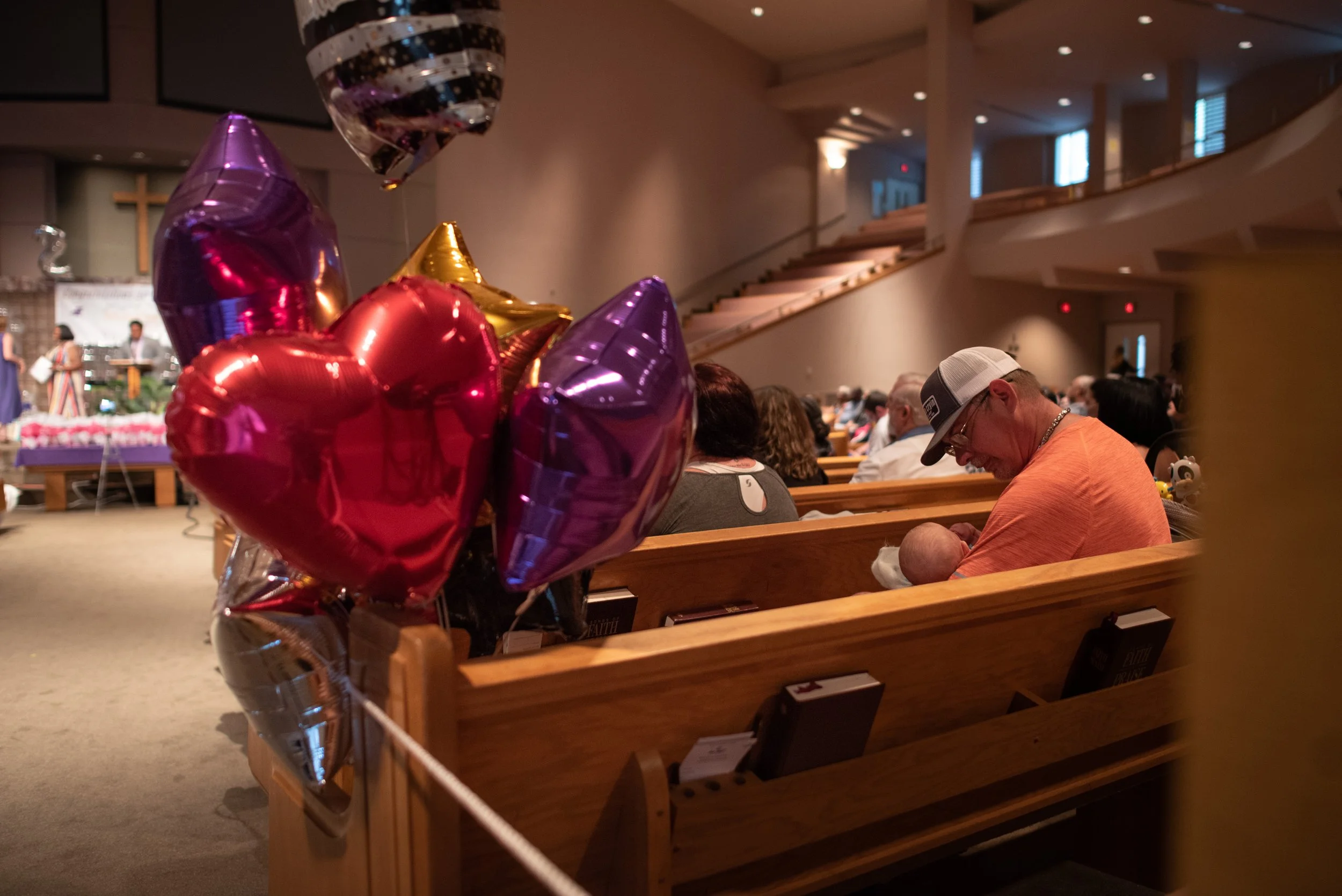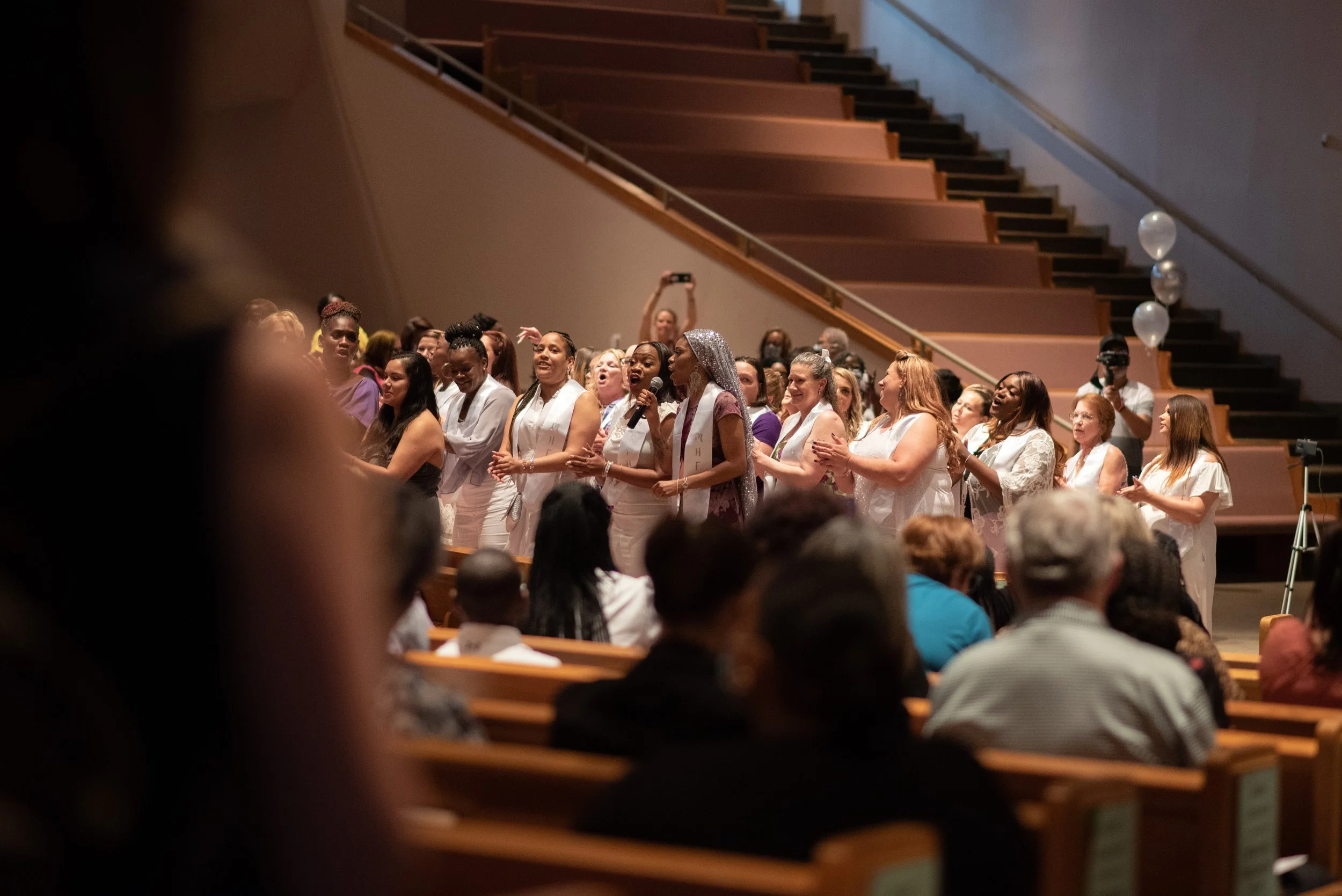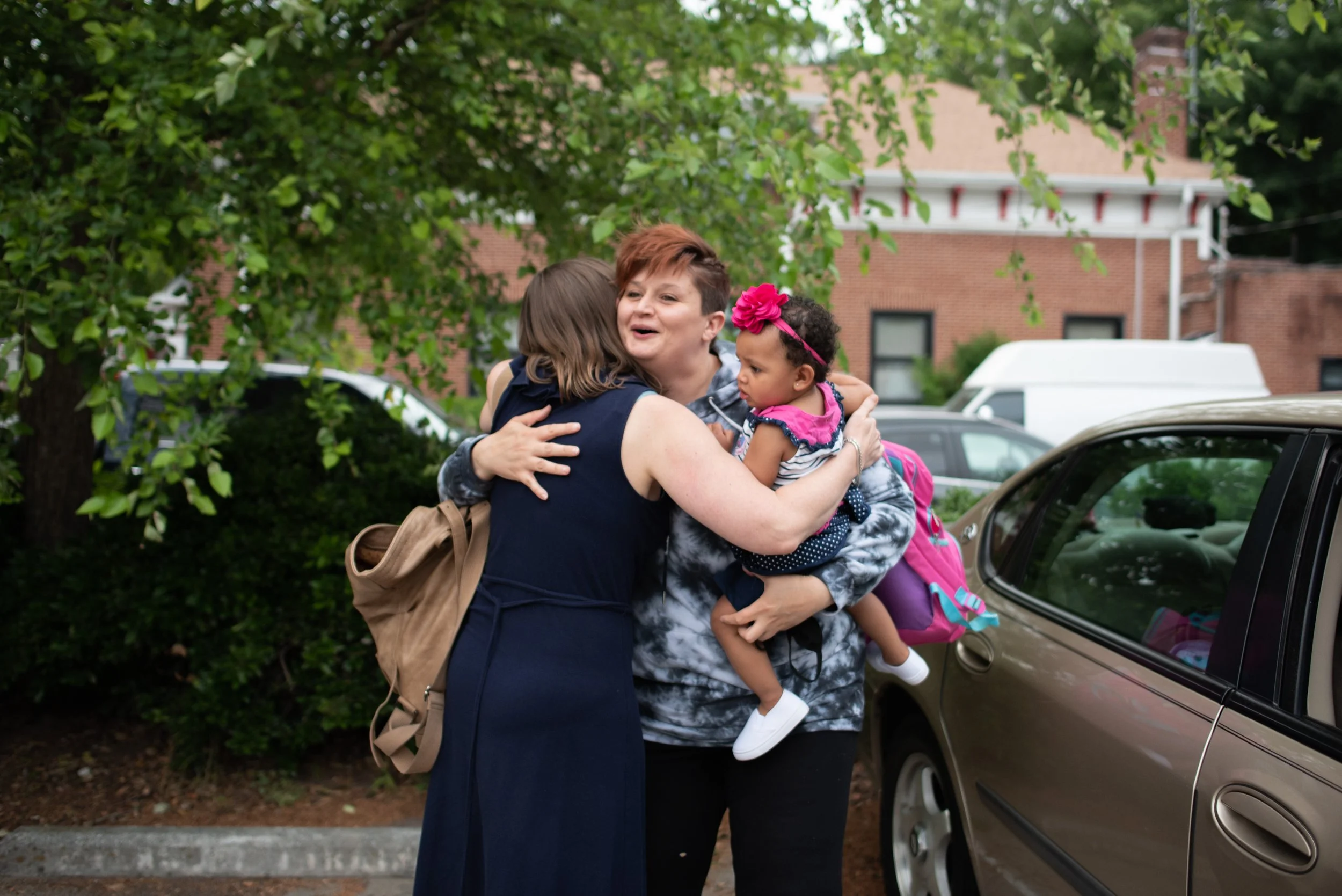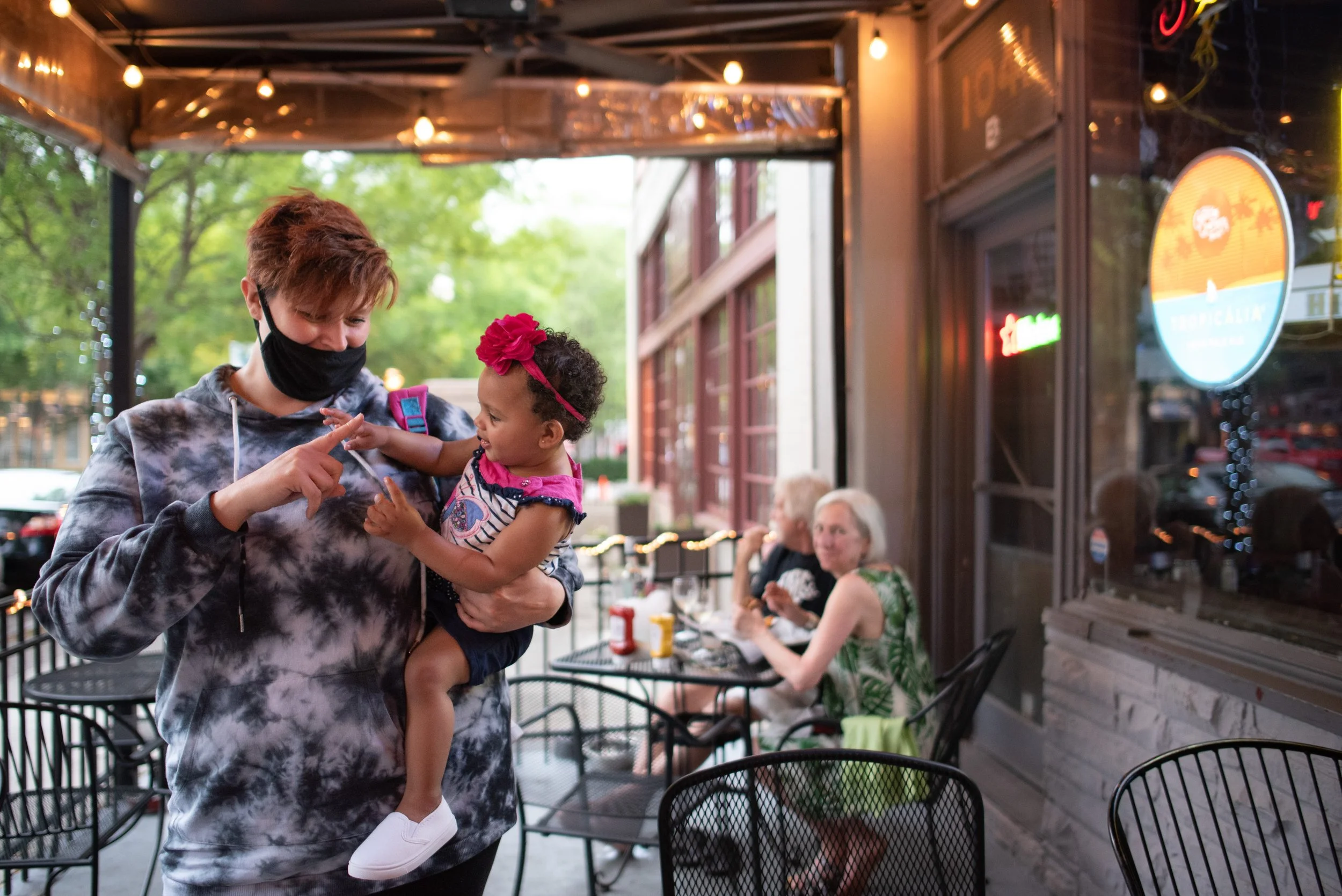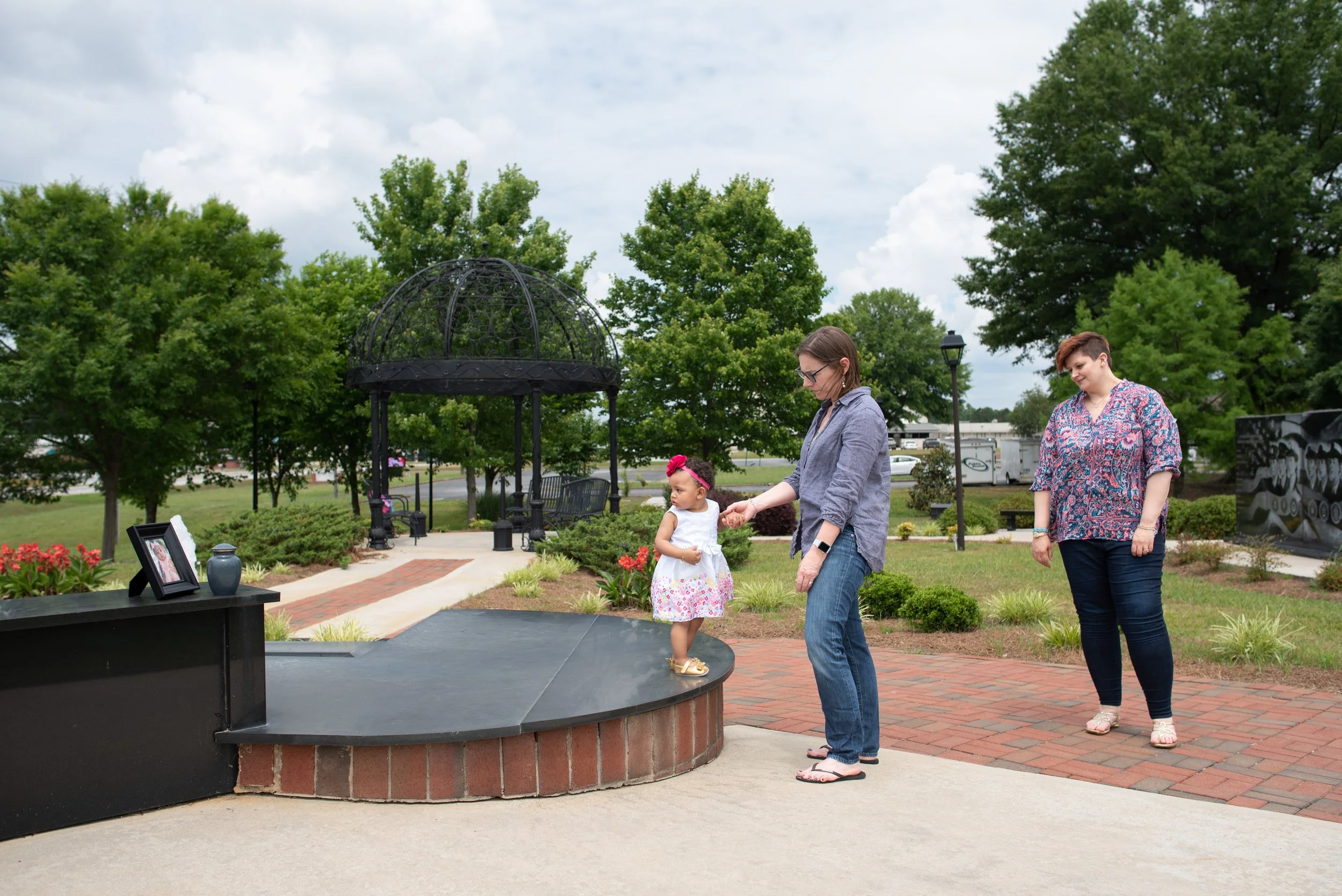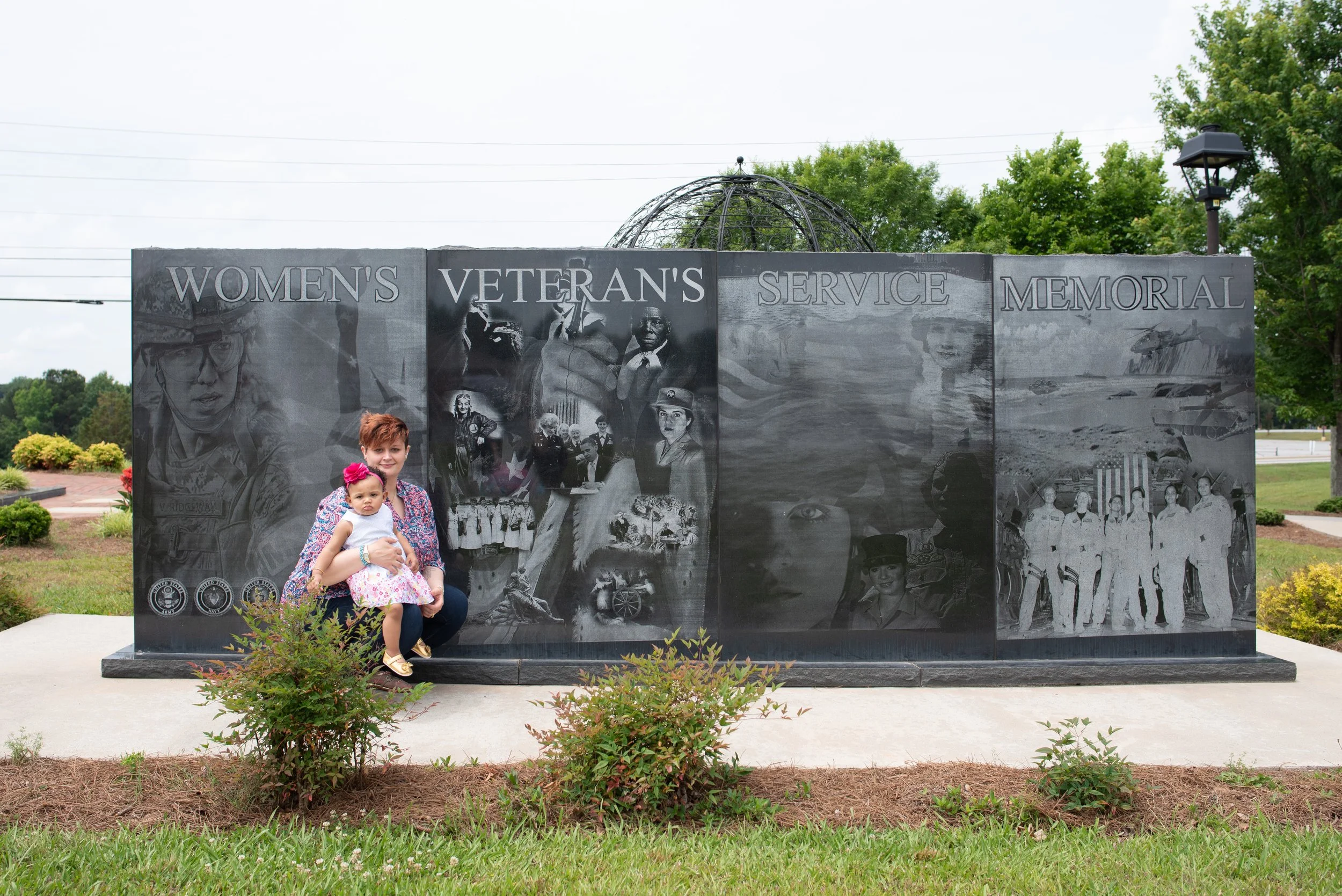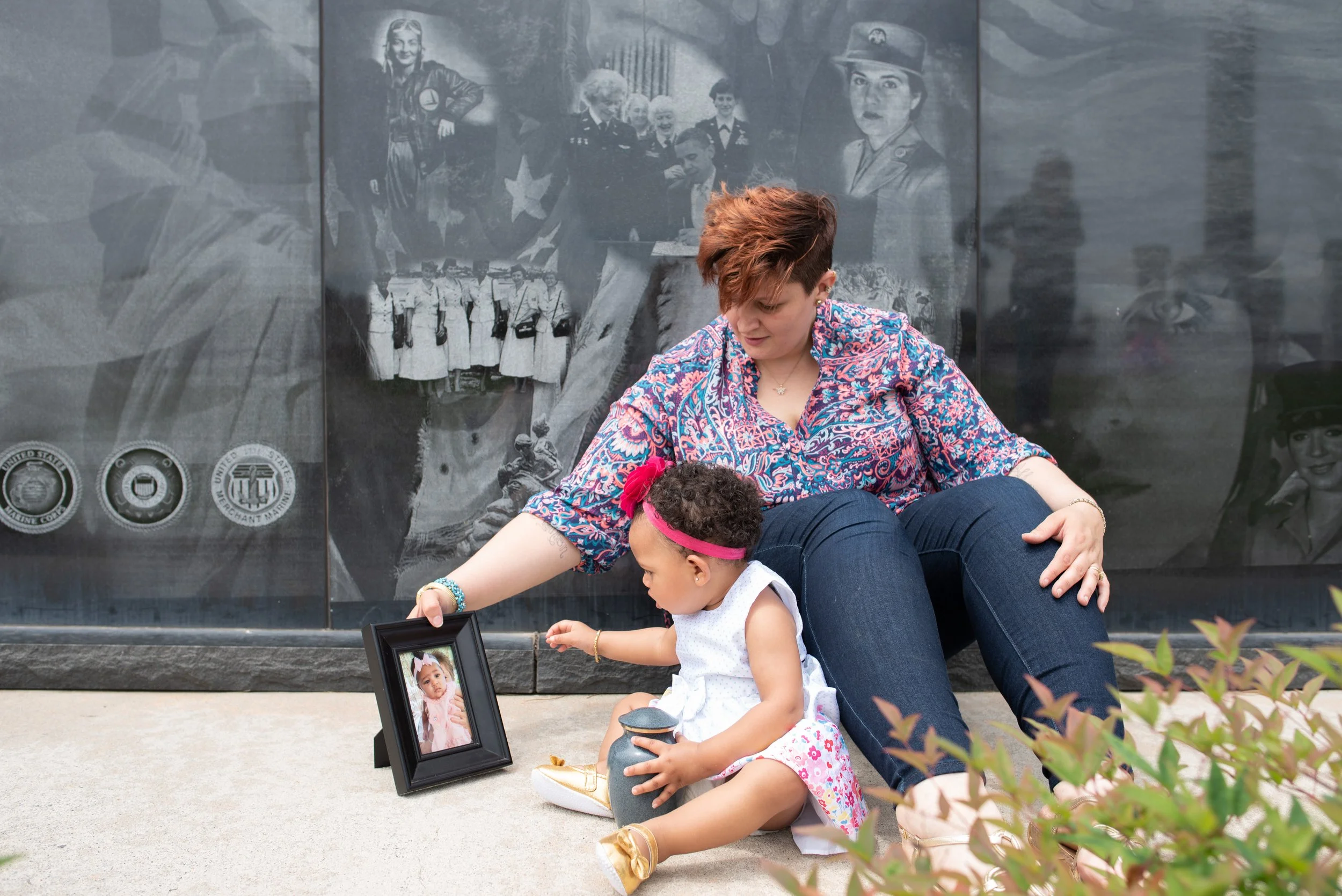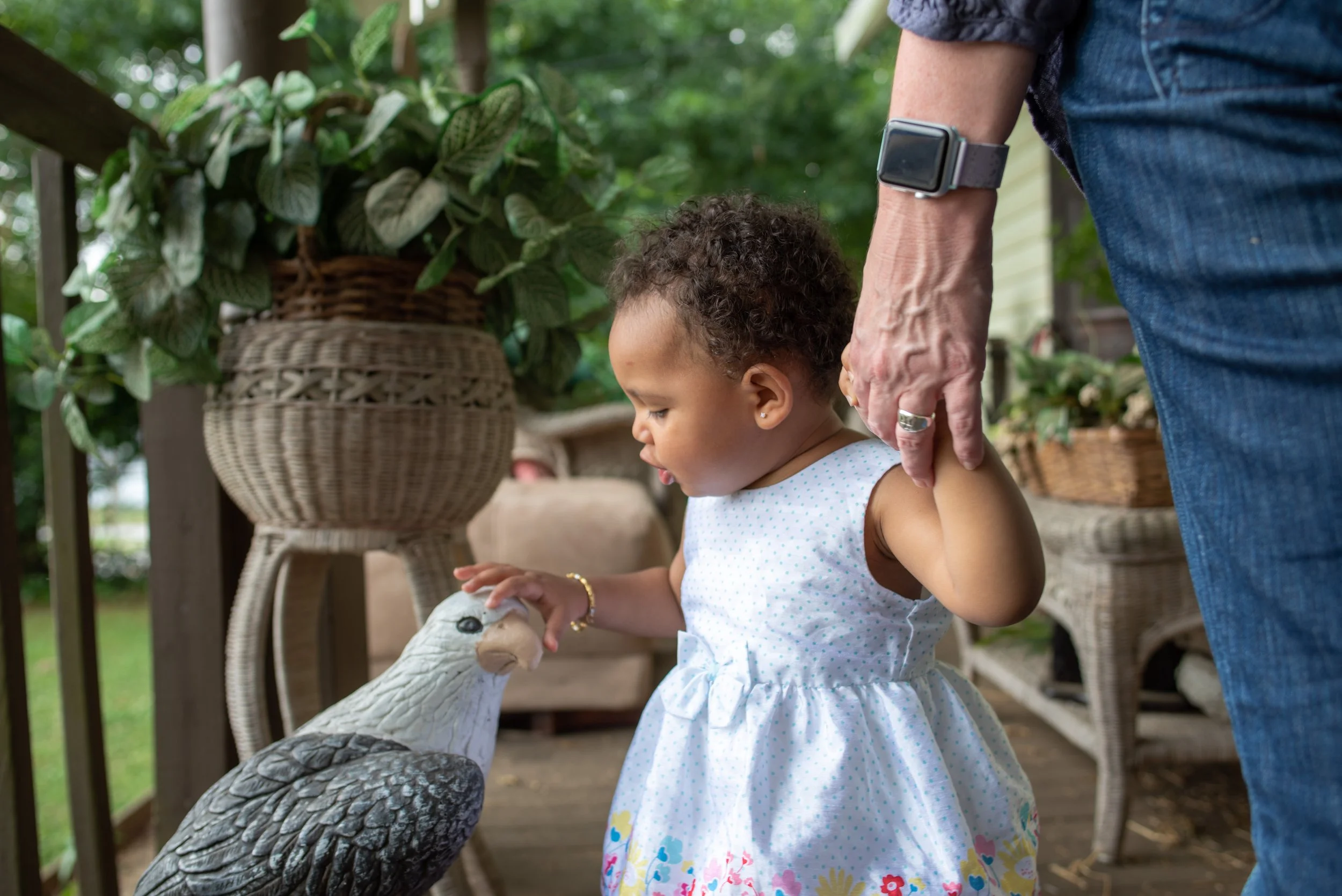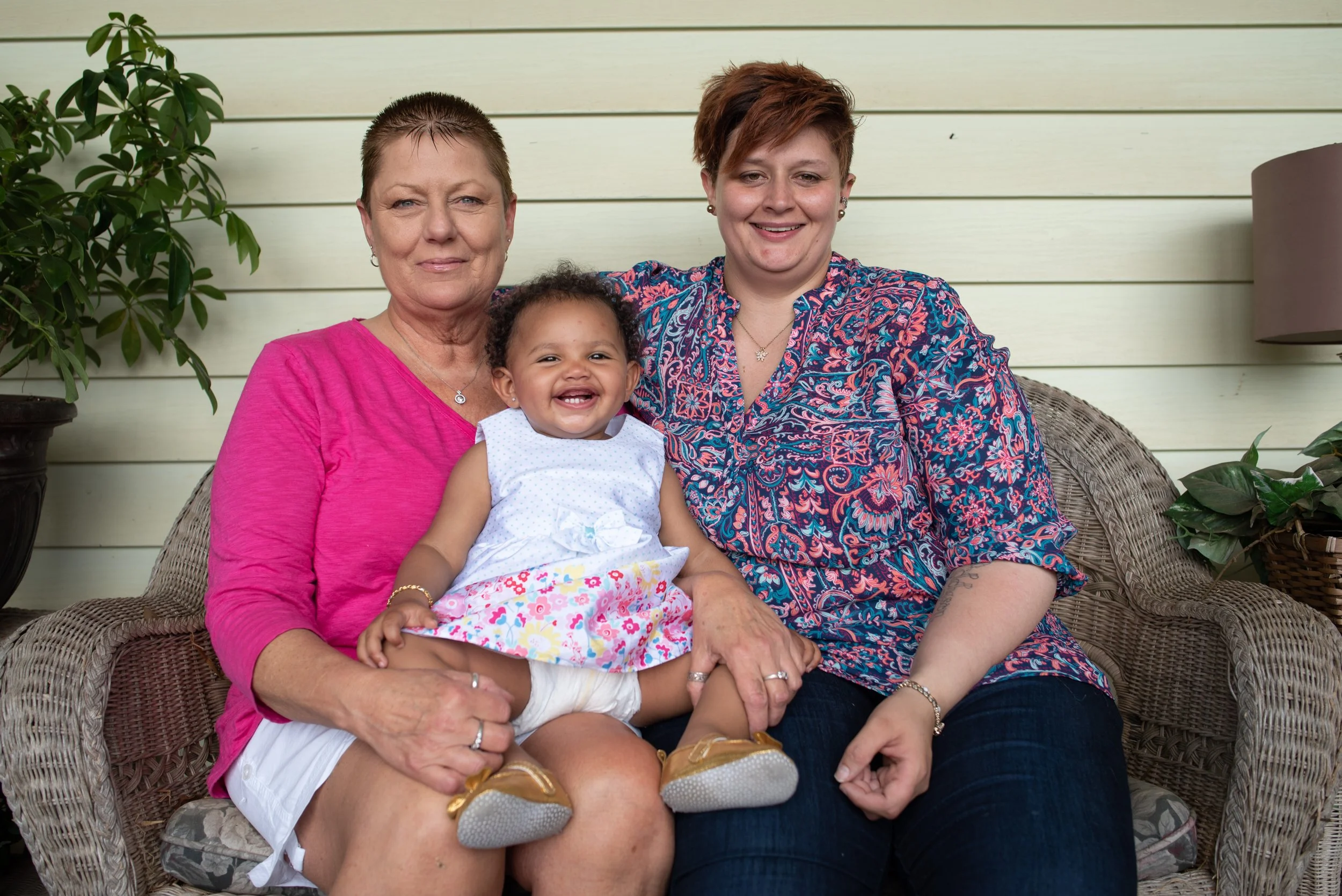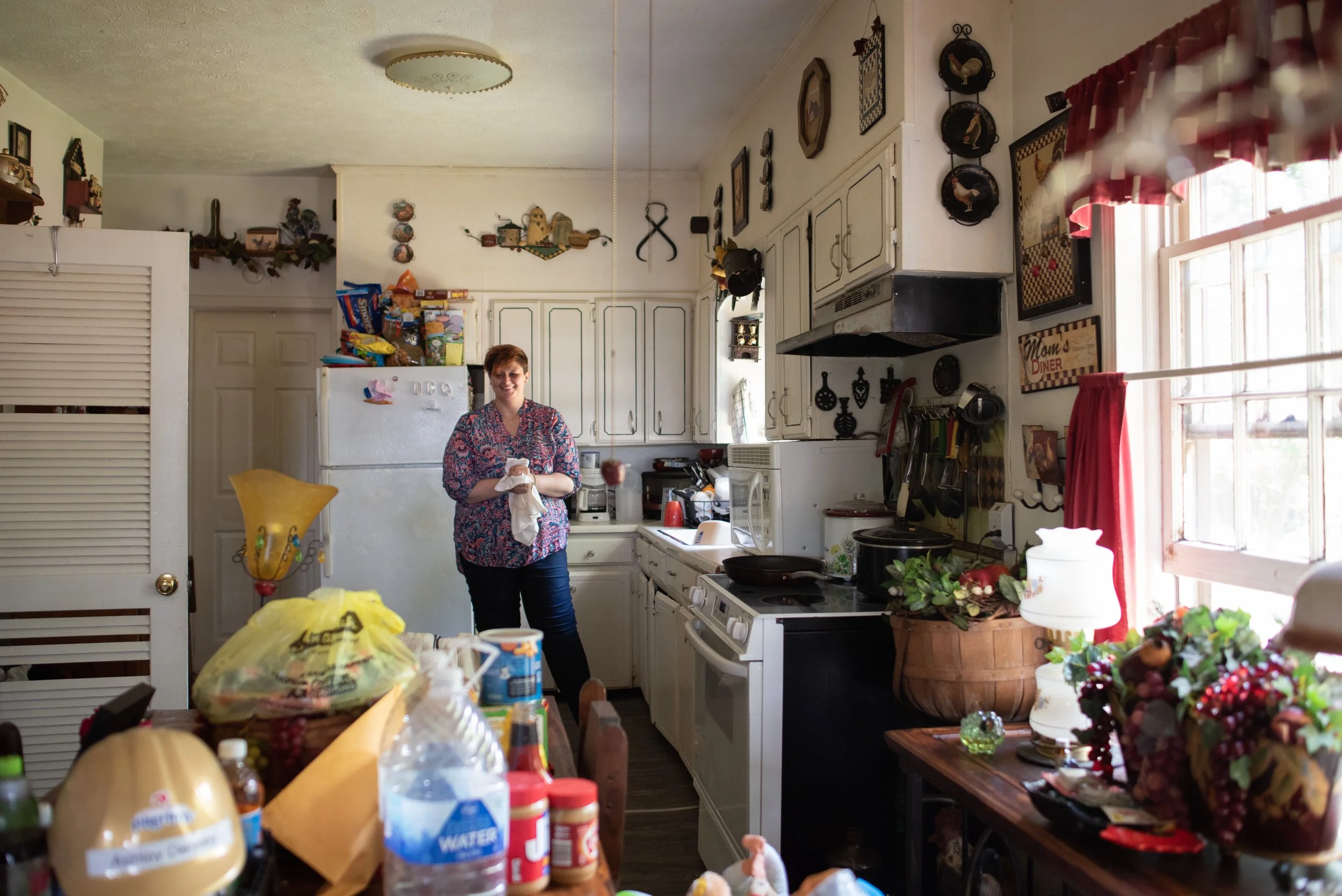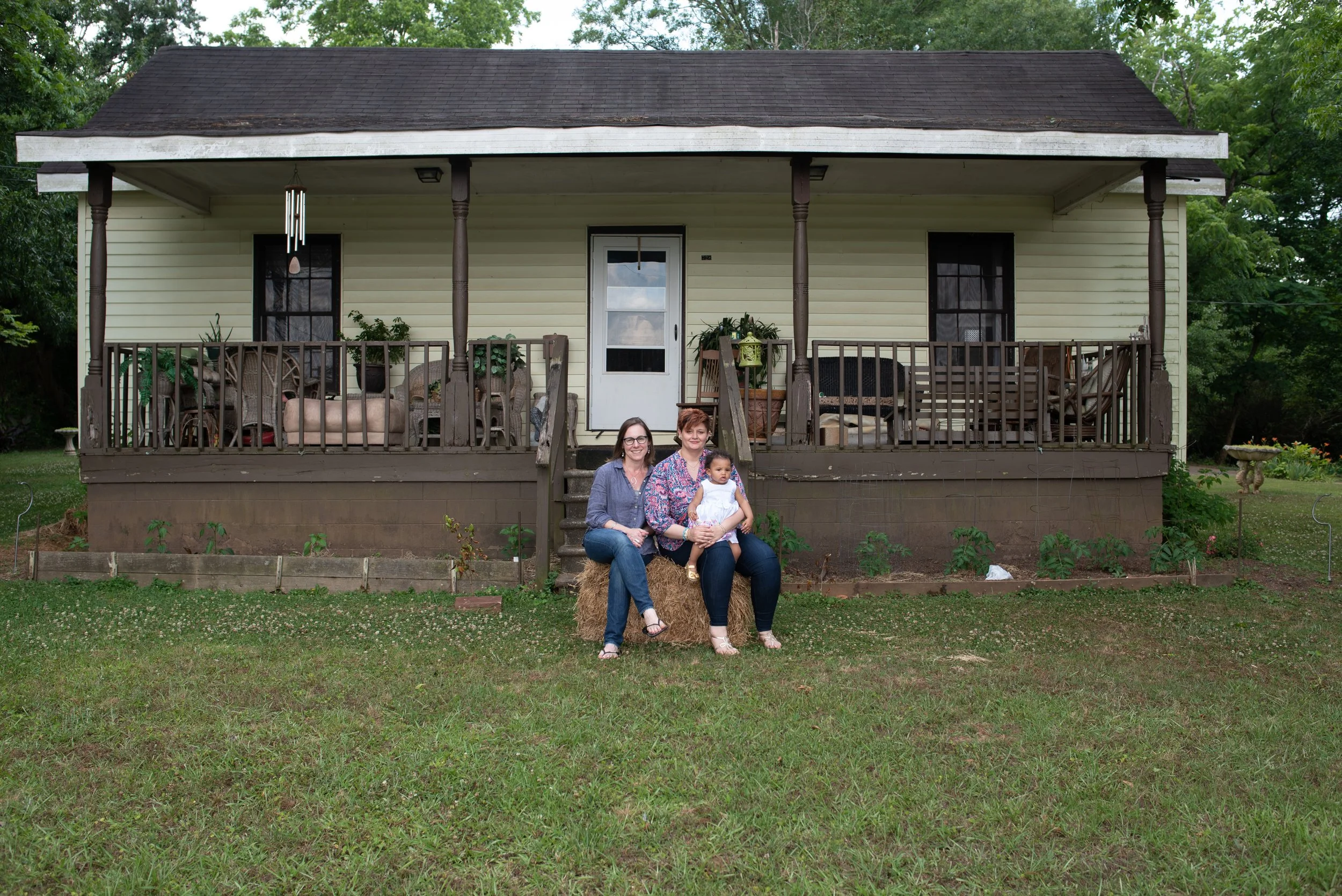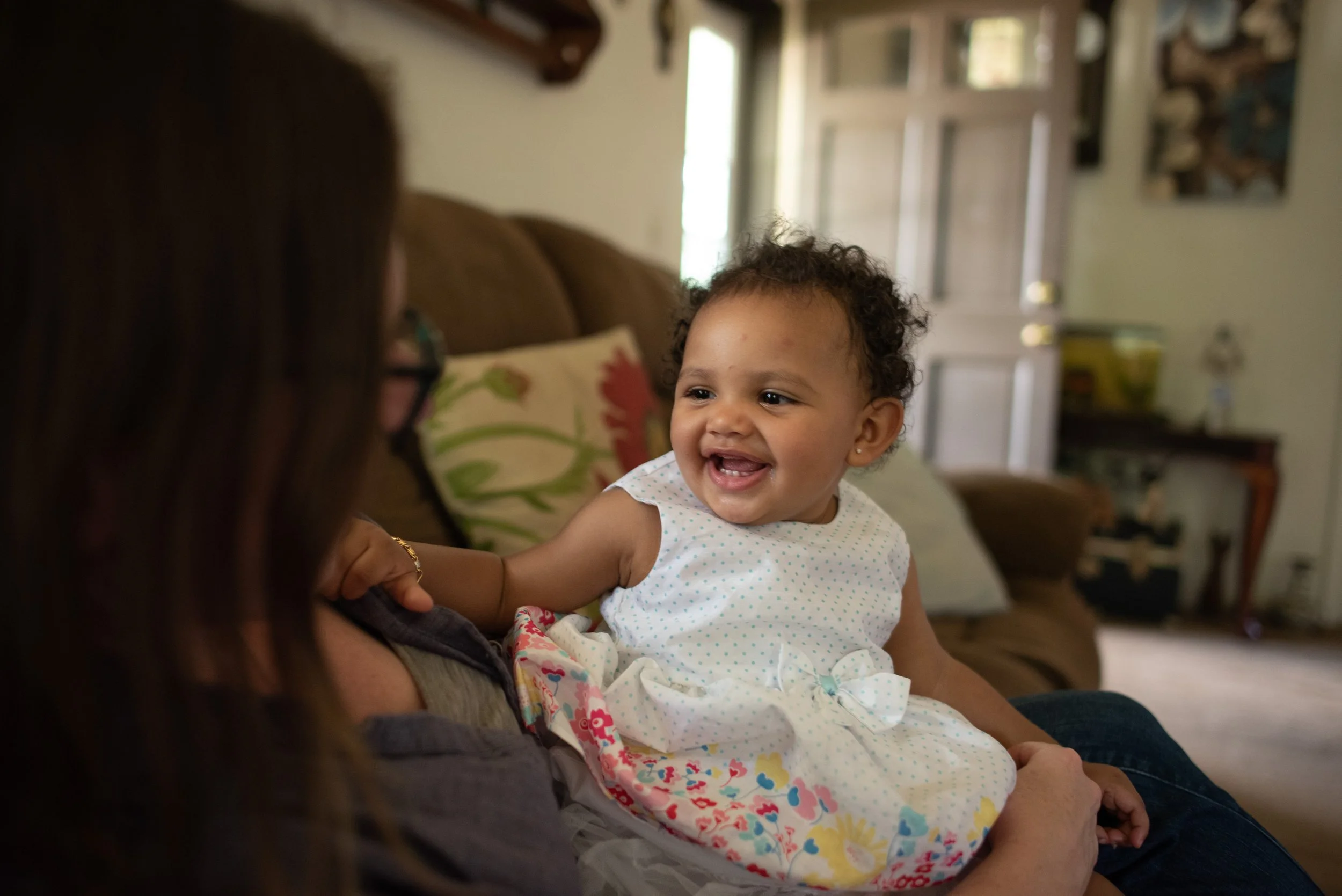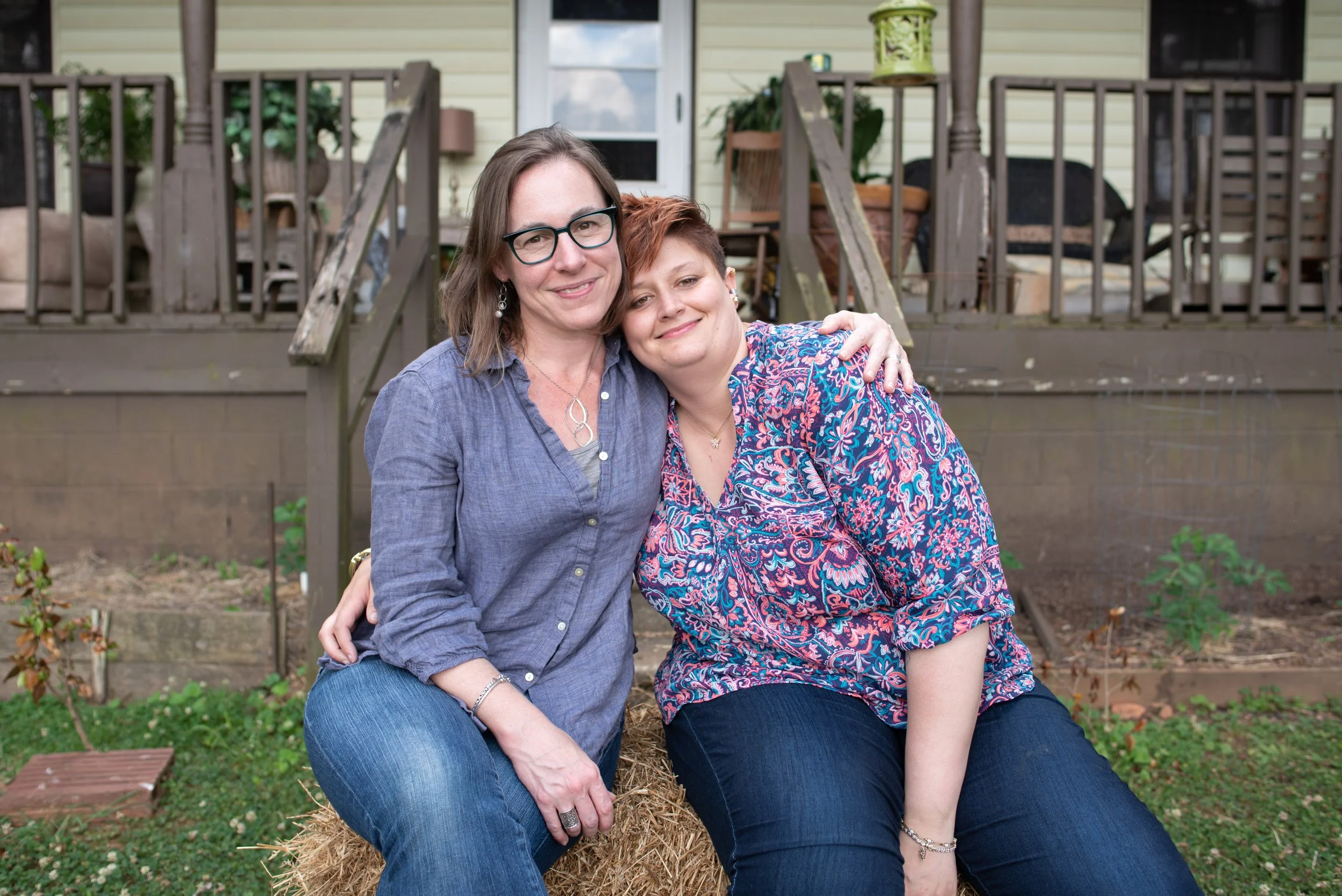Story #112 - Motherhood Beyond Bars + Ashley, Atlanta GA (USA)
I contacted Amy Ard, the executive director of Motherhood Beyond Bars, over a year ago with all the innocence in the world: “Hi! would you like to talk to me about your organization?”
What I didn’t know was that Amy is famous in the DMV [DC, Maryland, Virginia] birth and postpartum world, where she acted as a doula and mentor for years before moving back to Atlanta, her hometown.
I also didn’t know Amy almost never says yes to these kinds of interviews, too busy she is dispensing diaper boxes to caregivers, writing yet another grant, answering calls and emails from mothers in prison, or caring for her three children.
When I first talked to her for the podcast about her own postpartum periods, we were interrupted by a tornado alert that she kept brushing away. “These things are never real anyway.”
But when yet another person texted asking if she had found shelter, she admitted she probably would need to cut our interview short.
“Of course, this is happening. To be fair, it’s looking a little weird out there. I can’t even say that it’s my intuition to get my family in my basement, just the 10 000 texts I’m receiving asking if I’m safe. So… we’ll talk soon?!”
We did talk again, this time about her work for Motherhood Beyond Bars and how she left a busy and successful career as a doula in Washington DC to take over the nonprofit organization based in Atlanta.
We planned to meet in the Fall of 2020 so I could meet one of the moms she cares for, then “after COVID”—how naive of us—and finally, we settled on June 2021.
Day 1: Atlanta, GA
When I arrive at Amy’s house—her childhood home in which she lives with her husband, three children, and mother—I am welcomed by the thick smell of gardenia and magnolia trees.
After five hours in my car, it feels intoxicating and eerie.
Amy greets me from the front porch. She gives me something to drink and immediately sits back at the kitchen table, working on her laptop: “I thought I would have finished this grant by now. But the deadline is tonight. Sorry.”
I distractingly walk around as she finishes, sipping on my water. In the living room, a massive cello is dangerously leaning towards the wall and dozens of books cover the ground:
“I would have invited you to stay here with us, but as you can see, it’s a full house,” she says.
But because Amy is who she is, she has secured a little condo-apartment down the street, one that belongs to her in-laws. We drive over there not too long after, and I get to rest a little.
Amy Ard, Executive Director of Motherhood Beyond Bars. Source: Ariane Audet Photography
Two hours later, we’re on our way to meet Ashley, one of the moms Amy cares for. Today is her graduation from the Mary Hall’s program.
Mary Hall Freedom Village program was founded in 1996 to address the need for residential substance treatment services for women in the Metro-Atlanta area. The founders and many volunteers provide housing for veterans and families in need, as well as behavioral health, children, and family services.
Ashley attended the Mary Hall program for five months. “She stayed for almost the whole duration of the program,” Amy says as we drive to the convention center/church, where the ceremony is held. “Almost… I don’t really know the full story.”
Ashley is coming with her baby-daddy and her 10-months old infant, Emmy. As we wait for them in the parking lot, families and women dressed in all-white clothing flood steadily into the building.
“Ashley is not responding to her texts,” Amy says, then explains that the phone situation is not always reliable because Ashley cannot always afford to add funds to it. After a lot of missed calls, she finally gets ahold of her but the line cuts.
I feel a little ridiculous with my camera around my neck and my notepad. Obscenely out of place. Instead of leaning into my discomfort, I become restless and grumpy: why are waiting for someone who obviously doesn’t want to be here tonight?
At last, Amy’s phone dings:
I’m 40 minutes away, the text reads. We got lost. I’m tired of this shit happening to me, Ms. Amy. I literally had to change Emmy on the side of the road.
Instead of driving North, Ashley and her family took the wrong exit and ended up in downtown Atlanta. Amy sends her the exact address and some encouragement:
Just keep moving in this direction, she writes.
The heat is becoming unbearable so Amy and I move inside. There are distinct sections in the church for those who are vaccinated or masked, and those who aren’t. No one seems to care.
Amy mingles and greets the organizers. She knows many moms who are graduating and their parents, many of them caring for their grandkids while the girls are getting ready to make their big entrance in the hallway.
Mary Hall graduates on the day of the ceremony.
I’m growing increasingly nervous about the spread of COVID, so I retreat outside the theater, where all the graduates are waiting in a perfect line, talking excitedly, anxious to get in there.
One of the graduates is wearing a headpiece made entirely of sequins. She looks like a mermaid. “We are the sober sisters!” one shouts. Everybody echos. A cheerful song begins, and they walk into the church dancing.
When the ceremony starts, Ashley is still 30 minutes away.
“After I got out of the military, I was drinking and living in my car, but I made it.”
One after the other, the girls walk up the stage to receive their diplomas, sing or share a few stories. Those who are twenty-five years sober or twenty-five days are celebrated with the same loud flood of applause by the crowd.
“The first day I got to the house, I asked if I could take something from the fridge. I was told that I didn’t need to ask to feed myself at Mary Hall. And that’s when I knew I was in a safe space—that it’s where I needed to be.”
Amy moves in and out of the amphitheater to check on Ashley’s progress. Thirty minutes go by. Then an hour. When I ask her if she thinks she’s actually on her way, Amy shrugs: “I don’t know. But I’m hoping she is.”
Hope. There’s a lot of talk about hope that evening. Hope and unconditional love.
“Continue to do whatever He tells you to do,” the founder, Lucy Hall, says standing tall on the stage.
Lucy grew up surrounded by addiction, not knowing there was another way of life. At age six, she lost her mother to alcoholism and later lost two brothers to addiction.
Struggling with her own addictions later in life, she gave birth to her daughter at the age of 27. Fearing she was destined to repeat the cycle of generational addiction that had plagued her childhood, she decided to get help and entered treatment.
Then in 1996, she felt called to help other women and families struggling with homelessness, addiction, and poverty. She founded MHFV in one tiny apartment, housing two women. “Mary Hall,” the name of the organization, was also her mother’s.
As I pace in the skirts of the amphitheater taking pictures, I meet with a Black woman with a little boy in her arms who’s watching Cocomelon on her phone. “You’re comforting me so much in my screen-time choices,” I tell her. “My daughters love Cocomelon!” Her eyes smile kindly and she says that her grandson really loves it too. “What’s his name?” I ask, pointing to the child. “Oh him? I don’t know. He’s not mine. I’m just holding him while his mom is graduating.”
Further down on the stage, someone sobs in the microphone: “They showed me my life was worth saving.”
One after the other, the graduates walk on stage. The event is almost over, and still no sign of Ashley.
Next to me, the little boy cries.
“Can I do something to help?” I ask, but the woman shakes her head. “He sees his mama,” she says, pointing out over the stage. “She’s the only one he really wants.”
Someone else walks towards us: his grandma. “What’s going on, Elija?!” she says in a soft voice. Without acknowledging either of us, she takes him from the woman’s arm and walks away.
He has been named.
On the stage, everyone is wrapping up the ceremony by reading quotes the graduates have written down on tiny pieces of paper: “I learned to respect boundaries… I am now employed… I own a car and I can care for my children the way I used to… I finally have a chance.”
Amy emerges from the theater. She’s growing impatient: “Her baby daddy was showing his ass so that’s why she’s late.”
I learn that “showing his ass” means fooling around, and I chuckle with delight.
“Now that the graduation is almost finished, we’ll have to take them for dinner, somewhere. To make it at least a little special for her.”
We bring our attention back to the stage, where two other girls are reading: “I wish my mom, who died from her addiction, was here… I wish my dad, who died from HIV, alcoholism, and heroin was here… I just want to make my kids proud.”
Ashley calls again and we walk outside for some fresh air: “You’re how far away?” Amy says, throwing her free arm in the air. “You got lost again? Well, if you make it, we’ll take you to a celebratory dinner, but first, I need to know that you’re seriously on the way here.”
Ashley says that she is, and we agree to meet them halfway, downtown Atlanta. Amy goes back inside to grab Ashley’s gift bag with me in tow.
“This story is chaos,” Amy says.
She’s walking too fast and I can’t keep up.
“Ashley’s entire story is chaos... This is the cherry on the eat shit ass cake I was served today.”
I chuckle again, but nothing is funny anymore.
The founder of Mary Hall wraps up on the stage as we approach: “Keep praying, she preaches. Keep believing! This is only the beginning.”
On our way to the restaurant, I ask Amy how she keeps faith in the moms she serves if they bail out on her so much.
“I just see her keep trying. I know just enough about her story to know that she hardly stood a chance. Ever. Everything is fifty times harder than someone with an average life. So I try to celebrate her wins because I know how hard it has been. I never know if what I’m doing is enough, but I have to believe.”
We park in a tiny street not too far from the burger place. As we walk over there, we notice Ashley’s baby daddy beige sedan.
“Ashley’s been clean for months,” Amy says, waving to her. “But he’s recently recovered… ‘recently’, as in days.”
Ashley comes out of the sedan and slowly takes her daughter out of her car seat. Amy shakes her head and hugs her. “I’m just glad you made it,” she says.
Ashley’s boyfriend exits the car but keeps his distance, shifting his weight from one leg to another. He looks like a little boy.
Ashley explains that she was late in the first place because she couldn’t wear the outfit she had picked as it was too small on her. Then she hated all of her clothes. To make herself feel better, she went to get a haircut.
Amy cuts her short and tells Ashley’s boyfriend to park somewhere else because he’ll get towed if he stays where they are now. He ponders the situation for a moment, then obliges. As he drives away, the three of us start walking towards the restaurant.
“I felt like people would have been looking at me funny in the clothes,” Ashley explains. “Plus I never feel comfortable in these kinds of situations.”
She lowers her voice then admits that her boyfriend offered to steal an outfit for her. “I had to tell him he couldn’t do that,” she says shyly, waiting for Amy’s reaction.
She’s looking straight ahead. “You gotta be shitting me!”
It’s 9 PM by the time we start eating.
After driving all day and tonight’s rollercoaster, I can barely eat a thing, fearing everything will come right up.
I listen to Ashley and Amy talk about the other girls from the program and smile at Emmy. I can’t hear anything they’re saying, a mixture of extreme fatigue, loud tinnitus, and unfamiliar accents.
When we part, Amy reminds Ashley that we’ll meet her at her parents’ home the following morning for the full interview.
“So glad you’re coming to the hood and I don’t have to drive anywhere,” she says.
“You’ll be there, right?” Amy asks. “Promise.”
“I promise.”
It’s way past 11 when Amy drops me off at her in-laws’ condo. I take another long shower and shove two sleep aids in my mouth, then crash into a dreamless sleep.
Day 2: “Either Drugs or Suicide”
Ashley’s parents are Will and Sherry. Will is severely disabled, but Ashley has been taking care of his bandages and driving him to his appointment. In exchange for her care, he said he’d help her find a place to live.
When we arrive at their house, Amy points to the empty field on our right: “It used to be a meth house but they bulldozed it a couple of months ago.” I nod silently. “And that RV near that half-collapsed house with a tarp on it? It’s a meth lab.”
We park and get out of Amy’s SUV. As we’re about to get into Ashley’s parents’ home, a skinny man exits the house barefoot and walks towards the RV with a massive container.
Amy raises her eyebrows in my direction. “How do we think they stand a chance when they’re literally surrounded by that.”
We find Ashley and her mom in the bedroom. Sherry is trying to find an outfit to wear. Will greets us from the couch. “Sorry I can’t stand!” he says jokingly, pointing at the wheelchair in front of him. Emmy plays quietly next to him, putting one foot, then the other, inside her mouth.
Ashley comes and greets us. She changes her daughter’s diaper then puts her into a Sunday dress and a pretty flower headband.
Ashley wants us to conduct the interview and do the photo session at the Women’s Veterans Memorial down the road. Before leaving the house, Amy makes sure she has everything: Emmy’s bag, water, a picture of her other daughter, Adyson, and the urn that contains her ashes.
Ashley, Emmy and Ady in front of the Women’s Veterans’ Service Memorial in Atlanta, GA
It’s only 10 AM when we get there but already, the heat is suffocating. Ashley and I sit on a bench, directly under the sun, while Amy takes care of Emmy under a willow, encouraging her to walk on her own.
I ask Ashley if she’s ready. She says that she’s nervous.
“I feel like I want to reach others, you know? I want to say things that need to be said because the place where I was last year is not the place I am right now. I see a future now, and I haven’t seen that in a long time.”
I suggest she simply starts with the beginning of her journey as a young mom. That it’ll flow organically after that. She agrees:
“I was 16 when I had my first child. She was a girl. I had it because I was at a point in my life where I needed a family, and I wanted something to love as much as I love everybody else.
“I was missing that as a child, growing up in a home where my mom was an addict, so I began having children at an immature age.
“I love my kids, but I didn’t realize what it was to be a mother and then, the responsibilities it comes with. I made poor decisions in my relationships because of that longing for love and wanting my kids to have a family.
“I also ended up losing them because of that. Because I couldn’t hold my family together.
“My first daughter is 17 now. After I had her, I got into my first trouble. Like I said, I was immature and I didn’t have resources. No one to help me. The father left me so, once again, I was looking for that love and searching for a life.
“I got into a new relationship and became pregnant again with my son. The first 18 months were great but as young parents, we couldn’t hold it together. I thought that having a man that worked all the time would glue us together, but eventually, it wasn’t enough of a foundation, so it fell apart.”
I asked Ashley how she made a living when her boyfriend left her.
“I worked two jobs and couldn’t get housing or food stamps because no one would help a 17-year-old get housing. So after that, I kinda fell under. My mom was still an addict and DFACS [Division of Family and Children’s Services] stepped in and they took my baby. I lost it.
“That was the only thing that I had that I could love and that loved me back, and it just tore me like I’ve never been torn before.
“After I lost the baby, the two jobs in fast food I was working fell in, and I just felt like I couldn’t handle it no more. That’s when I began doing drugs.
“It’s hard because when you’re young and you already don’t have support, you end up going to court and DFACS is constantly telling you that you’re not enough, that you can’t get your baby back, but yet they’re not going to help you. And sometimes I think, well if y’all cared so much about the children and seeing them with their parents, why won’t y’all help me?”
I called DFACS when I came back to Virginia and requested an interview. But as with many government instances, talking to a knowledgable human was impossible. The person on the phone eventually referred me to their website and their 2020-2024 Strategic Plan to “operationalize efforts towards achieving safety, permanency, self-sufficiency, and well-being for children and families.”
The deliverables looked nice on paper, but as Amy pointed out to me several times, the entire strategy is mostly focused on children and the foster care system, not on providing resources for the birthing parents.
“I had to sign him off and ended up losing him altogether,” Ashley continues. “They terminated my rights.
“I do know that he went through a lot because the foster mom kept in touch with me later on due to his mental health. By the time he was four, he was going through a lot of issues. He’d stopped talking because he had a reattachment disorder due to the breakup. The foster mom really tried to keep in touch with me and stuff, but then finally, DFACS adopted him out and pretty much took him away from her and me.
“She would have adopted him, but she couldn’t. So she ended up being the foster mom of my next few kids after that. After I lost my kids the second time.
“I got stuck into a repetitive cycle: I’d get hopeful with a guy and think we could be a family. When it would fall apart, DFACS would step in, take my kids, and I’d get on drugs to numb the pain. People would say ‘Why would you want to forget your kids?’ but it helped me. Drugs helped me forget. It was the only way for me to survive that made sense. Because otherwise, I probably would have taken my life.
In the end, it was either drugs or suicide.”
“I ended up in prison shortly after,” Ashley says. “I had some pretty serious charges, and they were the results of me lashing out while trying to get the drugs.
“And I was terrified to wake up sober.
“I wouldn’t go to sleep without the drugs in my bra. I didn’t want to deal with any of it, and numbing the pain away seemed like the only way to cope.
“When you’re going through something like having your kids being taken away, people will introduce you to stuff like that. They’ll say, ‘Here, take a load of this and it'll help you.’”
I ask Ashley if they put her into a rehabilitation program or in a youth detention center but she shakes her head:
“By the time I was sentenced and sent to prison, I’d turned 18 going on 19, so they had me at a maximum-security prison for the first year. I did two and a half years there. I went through some treatment— the prison kind of treatment. It’s not very therapeutic, more institutional. They just need you to stay clean but don’t care much about what’s under and you never get to the root of it.
“After I got out, I stayed clean for a while. I also lived with my grandma, who’s a very religious lady and was very strict on me. It did help, because I had some respect for her.
“But I ended up meeting another dude and we started dating. He would go to church with me and then, basically, here we go again: I’m lonely at my grandma’s house and looking for love. Things started cracking down on me and I wasn’t dealing with any of the emotions.
“My grandma would slam me for it. She would come to my boyfriend’s apartment and bring me back home, saying she’d pray for me. But it wasn’t just about praying, wasn’t it? She didn’t understand when I started going out with him to other places besides church.
“He’d built that trust, that credibility. Sometimes, perpetrators will do that. He played on my feelings, told me he wanted a family… so we had three kids together.
“Life was okay in the beginning. He was responsible, went to work every day. But then on the weekends, when he was supposed to be with his family, he started cheating instead. He would leave me at his mom’s house and wasn’t there for his kids.
“I guess I had that false idea that a man should be the glue for the family. That’s what I grew up on. I was never taught to be independent unless you’re in the streets; then you hustle. That’s how I was raised: with men looking down on women. They’re supposed to be the head of the household, not the woman, and he ain’t supposed to do nothing but being taken care of by his wife.
“Our idea of a woman and a mother here in the South is that you’re a stay-at-home mom and you cook and clean for the kids and the man. You’re supposed to not care about what your man is doing as long as he’s working and feeding you.
“But deep down, I never felt that it was right. I tried to stick to what my grandma and my mom taught me, but I could see it wasn’t working, especially in this [modern] age where women are becoming more prominent. But I didn’t know how to do that for myself back then.”
I ponder with her what she would have needed to learn as a woman and a mother.
“I think I would have needed to learn how to fly. To fly like a baby bird pushed out of the nest by her mother bird.
“But it was too late for me then, so I packed my kids up and left, once again with the loss of that love.”
“My kids were less than a year apart from each other when I had them. I remember going to my five-week (postpartum) checkups for each and just being pregnant with the next. It was repetitive. I can’t even remember how it all happened to be honest, and it’s embarrassing. I just know it was a really bad time in my life.
“I also remember feeling pressured to have sex so early after my births. I feel like I needed to do what I had to do to receive the love I was looking for. I also believed that this was how families were built. You just lay down and you have kids, no matter what. And you take care of your man.
“After I moved out of my boyfriend’s house, I came back to my dad’s house. He got me my own apartment and he helped. I got a job and it’s the first time I learned how to live on my own.
“But soon after that, I fell on my face again because I got into another relationship.
“The guy would help me with my kids, and we ended up having two girls together. But once he realized I cared about him and how bad I wanted a family for my kids, he used it to his advantage. Towards the end, he was beating me up a lot.
“The abuse started when he asked me to quit my job and stay home. At first, I thought this was what I wanted and not because he was trying to control me. He said that he’d help me with the bills, but he lied about his job and was never at work. He was selling drugs or laid up with another woman.
“But I still tried. I tried to be that mother bird for my kids for a while after I left, but I knew I would never be able to teach them nothing. Eventually, I lost my apartment and DFACS came over. And I lost all of them once again.”
I ask Ashley if we can move. The busy road is too close to the Veterans’ Memorial and I know my recorder won’t capture her voice. I’m holding my phone in front of her face. “The sun is starting to burn my arm pretty badly,” I tell her, pushing my fingers into the doughy flesh that turns white, then bright red.
She laughs and we walk towards a little pergola, further up the hill.
The truth is that I need to take a break before I can continue listening to her story.
“Sometimes, I’m hurt that they’re gone,” Ashley says as we sit down. “But at the end of the day, maybe it happened because they’ll one day be restored to me when I’m where I need to be, when I can be the mom they need me to be.”
I smile at her, painfully.
“Being ripped from your kids, it’s the worst feeling ever. And no one wants to feel that attachment being taken away from you. So you numb yourself. I also think that I had a postpartum depression episode with one of them: I couldn’t feel anything. And people started saying it was because I wasn’t fit and it made me feel like a monster. But now I realize that I could have been going through something else because I know I have mental health problems.
“My aunt got one of my girls and my ex-boyfriend’s mom got the other one. But she lied to me when she asked me to take her in. She said ‘My son is no good, you need to leave him and I’ll take care of you.’ So I let her have my girl. But guess what happened: I haven’t talked to my daughter but four times since then. She’s ten years old now.”
I ask Ashley if she talks to any of them, respectfully trying to keep track of how many she has. Unable to figure it out, I finally just ask for the count.
“To be honest, I haven’t talked to most of them since they were taken away. In total, I now have nine children.
“For one of my sons, I fought really hard to keep him. DFACS worked with me for his case. Or at least, they said they did.
“At first, they broke all the kids up. One of them ended up with the foster mom who had taken care of my first kid. He was a quiet baby, really attached to me, so she would bring him to see me. I was so close to getting my kids back. I carried that case for two years, but right at the end, it failed.
“They told me I wasn’t enough.
“And it broke me. We had worked so hard and they really made me believe that it would work. They walked me through all the steps and when I went to court for my final reunification, they just abandoned me. Told me I didn’t make enough money for that many kids.”
I tell Ashley I’m not sure I understand how they couldn’t have figured it out before the two-year mark. After all, she was doing well.
“I had ended up pregnant again and falling for another man, so they had to redo my budget. That pregnancy was the deal-breaker, I guess because they count how many rooms you’re supposed to have according to the boys and girls. And in the end, they denied me to have my kids because of that. But they waited until the last minute to tell me. Tell me that it wouldn’t be enough.”
I nod. I can feel my guts churning.
“That two years of agony just broke me. I really had tried to do it by myself this time. I was jumping the nest, and learning how to live, but for what? To be knocked back down again like that?
“To feel like the very people who were supposed to help me ended up destroying me, that was my breaking point.”
We both fall silent and I tell her that we can take a break whenever she wants. She says she wants to continue. I can see how difficult it is to talk about her children and how angry she is.
“The System is unfair,” she adds. I agree. Above her shoulder, I watch Amy and Emmy wave at us.
“DFACS came into the hospital room when I was three days postpartum with my daughter, the one I was pregnant with when they took all my other kids. And when they came, they just said, ‘We’re here to take her from you too.’
“To feel like the very people who were supposed to help me ended up destroying me, that was my breaking point.”
To Hell and Back
“After they took my daughter to the hospital—and all these years sober—I went back to the drugs.
“I knew they were going to terminate my rights eventually, so why bother? The investigator and the defense investigator of the case had come to see me. I was able to visit her for maybe a month after that, but then they stopped my visitations rights on her and on my other kids too.
“I had thought they might have given me a chance with this one since she wasn’t even born when I went to court. I thought I could have another chance at fixing it. It made no sense why they took her too, she wasn’t even part of that case. But they did.
“So I left the hospital and got high on meth.
“I went with the first thing I could get to. I didn’t even care. I needed to kill that pain because that one was worse than the first one. It was like six heartbreaks in one.
“DFACS kept telling me I needed to stop having all these kids if I couldn’t take care of them. But honestly, they don’t know what’s going on; what’s going on right here, in my heart. I’m emotionally broken and all they do is criticize me and tell me that I’ll never be enough.
“These are supposed to be the people who help parents and their children. They’re called ‘Family and Children Protection Services.’ But they don’t care. Or not really.
“I know that I got through a lot of stuff and could have avoided a lot of problems. But at the end of the day, there’s a root deep down inside of me that I’m trying to work towards by peeling back all the layers. I just needed somebody to reach out and help me.
“Ms. Amy [from Motherhood Beyond Bar] was the first person who’s ever done that. She’s the first person that’s ever believed I could flourish. She’s trying to mend the kid who’s lost inside me. She’s my other mom, holding my hand and walking with me, teaching me how to grow.”
Ashley, her mom, and her daughter Emmy.
Family Tree
Knowing what I know about the broken children inside many of us, I ask Ashley about her family history. I expected to find some answers to fill the blanks of her previous story. What I got is a roadmap on intergenerational trauma and how we blindly and knowingly reject, as a society, to support vulnerable individuals from destructive cycles.
“My mom was an addict for 18 years of my life. She caught my dad cheating and left the house. Same as me. She lost her home and her kids.
“After she left us, I tried to commit suicide, so DFACS took me away and put me with my uncle.
“And my uncle, well, he molested me. It’s the school that called DFACS because they noticed something. They sent me to have a physical exam because I was really raw down there.
“And DFACS took me away. The defense lady was really mean to me. They put me with my grandma. I love my grandma but my granddaddy has always been so mean to me. He screamed a lot and would hit me with broomsticks, so I ran away from their home. I was 12.
“After living with them, DFACS finally put me back with my dad. I’m lucky because he’s always really been there as a man. It sucks because I had really missed my family and my mom, even after all she had done. I love my mom. I didn’t care about what had happened and being with my dad was like being one step closer to being with my mom, if that makes sense.
But DFACS didn’t care. They didn’t care if I had been raped and molested. It took me to go through all this to finally be put back into my own home.
“My mom was in prison by the time I came back to live with my dad. We didn’t have contact with her unless my dad let her call home. When she got out, she relapsed and I only got to see her once. So I tried to kill myself again.
“The EMT team that came on that day was the same as the previous time. After that, I didn’t want to hurt my dad anymore, so I started to cut myself instead. It was a way to release the pain. My dad, he didn’t know what to do. He didn’t even know how to buy me tampons! But he tried his best to love me.
“He also put me in Pathways. It’s a program I went to after school. But I got kicked out of there, too. They really tried with me but I was so angry, and I ran away to Texas. After that, they wouldn’t take me back. They said they couldn’t be responsible for me because they couldn’t guarantee nothing would happen to me and they were supposed to be responsible for my care. So I got expelled. And that’s when I ended up pregnant with my first baby.
“Looking for that love I was so desperate to get.”
I point out to Ashley that she didn’t use drugs before she was well into her teenage years. She agrees that it took some strength:
“I tried to die twice before getting to the drugs. But at some point, it was either suicide or drugs, so I chose the drugs. The vicious cycle had finally caught up to me.
“People think that you’re being a coward when you do drugs, that all you want is running away from your feelings. But really, it’s not that.
“It’s just that I don’t know how to deal with my feelings and I have this enormous pain hitting me from all sides.
“That period of my life after they took my kids is very dark. Meth alters your mental health and there are a lot of people who become suicidal after they clean off meth. So you just take more or else you’re irritable and angry.
“I can’t even explain how bad it was.
“I cut myself off any kind of relationship. Nobody could come close. I didn’t want any more kids, I just wanted to get high and live like that forever. That’s the way I was living and that’d be the way I was going to die.
“But I met a guy. An old friend. Since we had grown up together, I allowed him to become close and, ultimately, had sex with him. I wanted to feel that love again, or at least, that love for the attention he was giving me.
“Whether it was artificial love or real love, it didn’t matter. Love was just something that was better than everything else. Even better than getting high.
“But I missed drugs so much. My boyfriend was often begging me not to go, not to get back on it. But the urge was too strong. One night, he was crying and screaming and we took it outside, walking up the streets, him begging me not to go. But the police came and they locked me up and ended up locking him up too for disorderly conduct and family violence.
“Because I had a warrant, I stayed in jail for six weeks. As soon as I got out, I started using again, but super bad this time. My kids had been taken away, and in the meantime, my brother had gotten murdered because of his pills addiction.
‘I ended up on a high-speed chase where I ran from the police in my car. I really hated the police and felt like they were a part of DFACS so I just ran.
“I was sober when it happened, but I was sick. So sick I had stopped using for a couple of days because every time I would try to get high, I couldn’t do no dope and I’d throw up.
“There was a guy with me in the passenger seat and he threw himself out of it while I was driving. We had three pounds of dope and a whole bunch of stolen stuff in the car, so I guess he thought that throwing himself out of a moving car at high speed was better to get caught.
“Because of this, I also got something for aggravated assault.
“The police cars pinned me against the telephone pole because I wouldn’t stop. I couldn’t. In a sense, I think I was trying to tell them to go fuck themselves, that I wasn’t a coward. They might have taken my kids and weren’t going to change their opinion about me, but they wouldn’t take my pride.
“That’s how they got me.
“So I got locked up in jail and before I got sent to prison, they did a pregnancy test… that’s when I found out I was pregnant again.”
Meeting Miss Amy
“They never sent me to the hospital to see if I was fine even after discovering that I was six weeks pregnant. But the baby ended up being fine anyway.
“Being pregnant with her in jail and withdrawing at the same time was so rough. The guards there don’t care and we get no help. I’ve heard that some counties will put you on something or at least give you a cell by yourself. But that wasn’t my case.
“So I’m withdrawing, puking and stuff. And the girl in my cell helped me so much. She used to be a heroin addict so she knew. She talked me through and prayed with me. She was so kind.
“But two or three months after I arrived, she hung herself in our cell and died.
“She was going through some things with her kids and going down from heroin is rough. So she died. But you know, I couldn’t feel a thing. It was just loss after loss after loss.
“I was mostly focused on getting the hell out of there, and I’d heard of another prison called Helms where Ms. Amy worked. Girls would talk about how she’d throw baby showers for them and how good and helpful she was, and all about the classes she taught. It made me really want to go there.
“Between seeing my little baby on the ultrasound and feeling like there was hope, and knowing I might be able to go to this prison, I felt like it might be fate. That there might be hope.
“So I put in for a fast and speedy trial and I pleaded out to go to this prison. Everyone thought I was crazy for pleading but I didn’t care. I just wanted to go there. I felt like this would be a place where they really cared for you.
“What I didn’t know was that they automatically put you there when you’re pregnant, whether you plead guilty or not.
“But anyway… I got to meet with Ms. Amy and her volunteers. I also had a GED teacher to help me pass a couple of classes. Between her and Ms. Amy, I was able to graduate. Amy was actually the one who paid for my graduation.
“These women gave me a reason to do better.
“They made me understand that I was so much more than just a junkie or a stay-at-home mom. That I had a purpose and that this purpose was not only to be a mom, but I could also be a great mom with a job.
“Ms. Amy, she does the hardest stuff for all of us and our kids. She’s a role model. A mentor.
“Because of her, I found out that I scored one of the tops in the state for my GED and I couldn’t believe it; couldn’t believe that I might be smart.
“She also threw me a baby shower. I’d never had food from a bakery shop before and it was amazing. For me, it wasn’t a baby shower in prison, it was something really special that someone had prepared just for me.”*
Amy, Ashley and Emmy in front of Ashley’s parents house.
“My baby’s name was Adyson.
“She was a little peanut. I used to call her butterball because when she was born, she was so short and fat.
“The delivery was really hard. I was on blood thinners and my cervix would sometimes bleed during the pregnancy, but they still ended up making me have her four weeks early.
“Usually, the county will induce every pregnant girl at 39 weeks, with or without good medical reasons.
“I had to go at 35 because I was on these meds and was bleeding, but the baby was fine and I had been educated about the fact that it might just have been normal bleeding. I didn’t want to have her but the doctor kept pressuring me. Three days in a row like that.
“In the end, I wasn’t bleeding anymore and they could have sent me back to prison but no, they kept telling me that I had to have her. So they did what they wanted and broke my water.
“They knew that I was on blood thinners and so the risks associated with the c-sections were higher. And because my body wasn’t ready to be in labor, that’s exactly what ended up being needed: a C-section.
“They don’t care there. They don’t care about you dying.”
“Ady, she came out floppy and had to go to the NICU.
“I think they somewhat felt bad because I was allowed to go with her upstairs. Usually, when a girl has a baby at this hospital, they put us in the basement. The showers aren’t even working there.
“You get a couple of hours with your baby, if that, and then the person you put on a piece of paper to take care of your kid comes and gets the baby. You don’t get to see that person, you just hand your newborn to someone from the hospital and hope they give it to the right caregiver.
“After two days at the hospital, they give you your old clothes back, no pads or anything, and send you to prison.
“But like I said, I guess they felt bad about the C-section and I was able to stay with her for three days. My lower body was in horrible pain. During the surgery, they had given me the epidural so high that I couldn’t even move my leg a little, and the nurse dropped it on the side of the bed, dislocating my hip.
“Someone from [MBB] came and we took a million photos and they made an album for me to look at once I would go back to the prison. The NICU floor was over the skyline of Atlanta. It was beautiful.
“Ady got to go live with my parents because my mom had been clean for a while then. She was the caregiver I had put on the paper.
“When I got back to the prison, I called my mom and she was surprised: no one from the hospital had called her to get my baby. Because it was late at night, they made a big fuss about her and my dad coming to get her but she was like, “The hell with it! You can yell at the person who didn’t call me.”
Emmy with Amy.
“Going back to prison being postpartum is hard. Not only you don’t have anything to care for your bleeding and your body, but you also don’t return to the same place [Helms]. That place is just for pregnant girls. I had to go back to whatever other prison they had me in before.
“It’s super difficult because you have to let go of the sisterhood and the therapy and classes you’ve got there, and go back to a cold dark cell. The prisoners were super hateful because they usually have been there for years and are not coming out any time soon.
“So there I was, bleeding through my uniform, no pads or toilet paper. Instead, I used my towel and when I felt the blood gushing out, I hoped to get to the shower in time to wash it out.
“I tried to stay positive, though. I had Ady and I just knew she was my angel. She gave me hope. Staying at Helms gave me hope. Meeting Ms. Amy gave me hope that someway, somehow, another person could show up on my path and care. Care about a convicted felon and a drug addict. Someone who gives a damn about me even if I’d lost my way because I was going through something mentally.
“I didn’t even get depressed this time. I was ready.
“There was a lot of gang violence at the prison. It was acceptable to get beat up or stabbed. Before I had been transferred at Helms, someone had punched me in the stomach while I was pregnant because of a phone call situation. So when I came back to it, it was so rough. I didn’t want to get in trouble and I just tried to keep my head above water.
“I made a few friends. One of them was named Squirrel and there was another Mexican lady. She was a mom to several prisoners and was really liked. She took me under her wings. I don’t even know what her real name was.
“We had several baby mamas with who I became friends. Girls named Jessica, Betty and Mermaid.
“I tried not to call home too often because it was getting expensive. So I waited a couple of weeks after Ady’s birth, but one day, I had this weird feeling that I had to call my parents.
“The feeling was so strong, it pulled me to the phone.
“There were people already talking but I didn’t care, I needed to call.
“When my dad answered, all I heard was the ambulance in the back.
“My dad wouldn’t tell me anything. He said he would call back and I just screamed and yelled for him to tell me what was going on. But he hung up on me.
“Thirty minutes later, I called again and my dad answered. He was crying. He said, “I couldn't talk to you. I couldn’t… because I was trying to resuscitate Adyson.”
“I didn’t understand.
“He said it again, ‘I was trying to resuscitate Adyson, and now your mom’s gone in the ambulance with her.’
“After that, he said something about not being able to take this anymore, and hung up.”
“I’m still angry about that, about my dad hanging up on me and just leaving me alone with my thoughts.
“I’m scared of that anger. I’m scared of dealing with it.
“I paced the floor so many times that night. I couldn’t even cry.
“To be honest, I think that I’m still shocked about it. Numb. And if I start pulling on that string, I’m afraid of what’s going to happen. I’m afraid I’ll start using again.
“It took me days to talk to my mom. When she’d gotten back from the hospital, she called the prison many times but no one came to get me. No one told me my mom had been trying to reach me about my daughter.
“When I finally talked to her, she said that Adyson had passed away [probably from SIDS.]
“My dad didn’t even want to tell me. He said that I wouldn’t survive that, not in there.
“He’s so crippled and yet, he was the only one who knew how to do CPR. He tried to save her. I know he really tried.”
“After her death, I had another year and a half inside.
“I kept Adyson’s memory alive inside of me the best I could. I haven’t dealt with the pain yet, but I know she’s my angel. I tried to remember the times I saw her before she passed. And I decided to push through.
“I think God blessed me with her, to make me see that my baby and my kids are the only things that matter.
“Ady, she blessed me with hope.
“At the prison, I learned how to weld and met another incredible lady, Ms. Faults. She was over the top and pretty badass. Because of her, I got on this kick about women’s empowerment. Women are so much more than just stay-at-home. That’s when I learned about these ladies on this wall [on the Women’s Veterans’ Service Memorial].
“They’re separated from the other veterans, and I don’t think it’s fair. But they’re Wonder Women, and that’s why I wanted to come here today. Like them, I learned a skill to have a real job and how much women are worth.
“I’m working hard this time on trying to break the cycle. To break it within me. And welding was helping. I got all dusty and smoky and it just felt so good. I was learning a man’s job and learning how to show them what I could do.
“I scored the highest on my welder association test. I could have had a job when I got out but one of my teachers once told me that I shouldn’t settle for anything under $18 an hour. So right now I’m being picky, cause I don’t want to just jump into something and get too overwhelmed and run into a tree.
“During my time in prison, Ms. Amy started doing postpartum classes and most moms got to talk about their kids and visit with them, but not me, so it was hard at first.
“Sometimes, it would send me to a dark place, but once again, I chose to not let it win. Ms. Amy would show me another outlet and that’s when I started drawing angels.
“I had this dream one night of an angel. Each strand of her hair looked like a rainbow, and she was shining. In her arms, there was my baby and her wings were wrapped around her.
“I was terrified to leave the prison and come home.
“My parents live together now, as friends, and after they picked me up and drove me back, I got to go pick up Adyson’s ashes.
“I had her cremated because I wanted to be able to say goodbye to her body and in prison, they wouldn’t let me attend her funeral. I couldn’t imagine putting her in that cold ground: that would never have been closure for me.
“But I didn’t expect how much picking up her ashes at the coroner would affect me, and, um… I ended up relapsing. I relapsed, got pregnant again, and long story short, I didn’t want to put this baby in danger so I quickly reported to parole.
“I got to go through a 12-week class and was able to stay clean through most of the pregnancy, but I relapsed again towards the end because I went through a lot and ended up in jail again.
“All this time, I kept in contact with Ms. Amy and I knew she was really worried about me, especially since I was pregnant.
“I was able to go to Mary Hall due to Ms. Amy. I stayed in their program for five going on six months. I got several awards and did a lot of progress.
“After I delivered Emmy, I transitioned into being a mother and they were really proud of me. I got to keep her this time and I just fell in love.
“Ms. Amy contacted DFACS and helped me add things to my file that would help me keep my child.
“I also got to breastfeed her the most, which is also something that DFACS looks for. Ms. Amy taught me about all the nutrients and how good this was for me too.
“I’m ready to be a single mom and do the damn thing for real.”
I tell Ashley that she has what it takes to carry on and confront her demons. That despite the fear of falling apart, she is not alone anymore.
“I never thought nobody would want to hear my story,” she says, “But here I am, telling it. I want to believe that our stories need to be heard. Yeah, to be heard is what makes the difference. Cause we, we matter too. We matter too.”
“You matter, point,” I say. “You all matter.”
*Editor’s Note
Amy did not meet Ashley when she was pregnant in jail for the first time. She therefore could not have been the one who paid for her GED or hosted her baby shower at Helms. Amy met Ashley when Adyson had already passed away.
We still wanted to include Ashley’s version of the story, as we believe it showcases the impact Amy’s care and support had in her life.
UPDATE, February 2022
Throughout the summer of 2021, Amy and I kept in touch.
She told me that Ashley’s baby-daddy landed in jail and that she was pregnant again. “I think she’s doing well,” Amy writes to me, “but it’s a whole cycle of shit that she can’t get out of. She doesn’t have a phone anymore so I have to try and catch her when she’s at her mom’s house. She hadn’t even been to the doctor when I finally caught up with her last week. Her one job after we got off the phone was to set up an appointment with the OB… I’d love her to come to the conclusion that she cannot mother this new baby. But that’s not the direction she’s headed.”
I ask Amy if she thinks Ashley is using again.
“She says she’s not. But it’s hard to know because I can usually tell when she drops off the face of the earth that she’s using, but now she doesn’t have a phone so it’s hard to know from previous patterns.”
We leave it at this, promise to keep each other posted.
Then on January 14, 2022, I received another text:
Got a call from Carroll county jail today that I knew would come and hoped it would not. Ashley’s back in jail. I was her one call. She’s 8 months pregnant.
We discuss what led her there again, trying to piece up the puzzle together, but there are giant holes in the story. Ultimately, we agree that knowing the whole truth doesn’t matter as much as understanding that this story is a tragedy in which humans have been broken over and over again.
Ashley has been transferred back to Helms because she’s pregnant. But as Amy explained in her podcast interview, she and her organization are not welcome at the prison anymore to support pregnant women because they raised concerns about the inmates’ treatment. “They said it was because of COVID but I know they just don’t like when we criticize them for, you know, being inhuman,” Amy says.
Since last year, Motherhood Beyond Bars shifted its focus on helping the caregivers of babies whose mothers are still in jail. They provide diapers and support and act as liaisons between the women and their children.
At the time of publication, Emmy was living with her paternal grandparents, who also want full custody of the child to come.
As for Ashley’s parents, they are unable to care for any of her children. “Her dad is dying,” Amy writes. “And her mom is incapable of taking care of these babies. She always calls the other grandparents to come get Emmy when she’s there visiting.”
When Ashley got out of quarantine two weeks after Amy’s previous text, she wrote to Amy. Her message reads like this:
I don’t think Ms. F. [her boyfriend’s mother] would be a good placement because of the history… NOT A OPTION… so as of now I have no one to pick up the baby…
Her new name is going to be Ellison Lashey… Once I’m out I fully intend on getting Emmy from F. & R. and like my mom’s situation… I WILL NOT LOOK BACK, I’M DONE.
I also called the hospital yesterday to check on my daddy and well… his room was empty and he was no longer there… I’m very sad but he’s free in a way… with Ady and my brother.
I want to build a whole new life from the foundation and the sky is the limit… I want me and my babies to be together happy whole and healthy like I promised my daddy…
Once again I’m sorry for failing. But this time is different. I can feel it, Ms. Amy. I really can.
Thank you so much for not giving up on me and my babies.
I love you.
Ashley.



